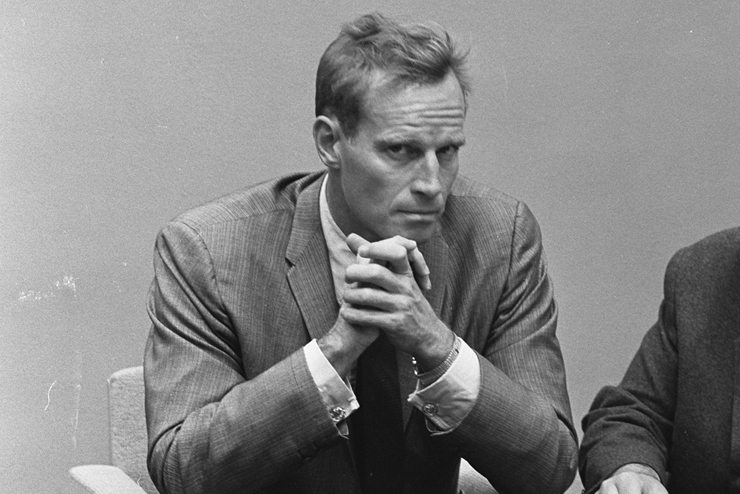Combine Moses and a Harvard discourse on cancel culture and one encounters a perfect storm for prophetic words.
That’s exactly what happened on Feb. 16, 1999, when Charlton Heston, movie star and president of the National Rifle Association, addressed a standing-room-only crowd at Harvard Law School. The film actor who played Moses and Ben Hur spoke to the students and faculty about American rights, particularly free speech, and the vital importance of speaking up for liberty.
Today the “woke” and “cancel culture” crew of our major universities would likely have rioted and driven Heston from the stage and the campus. Yet his remarks act as both a warning to all Americans and as a poignant reminder of what we have lost in so short a time.
Referencing Lincoln’s Gettysburg Address, Heston declared, “I believe that we are again engaged in a great civil war, a cultural war that’s about to hijack your birthright to think and say what lives in your heart.”
He then quotes from Martin Gross’s book, The End of Sanity, noting that:
“[B]latantly irrational behavior is rapidly being established as the norm in almost every area of human endeavor. There seem to be new customs, new rules, new anti-intellectual theories regularly twisted on us—foisted on us from every direction. Underneath, the nation is roiling. Americans know something without a name is undermining the country, turning the mind mushy when it comes to separating truth from falsehood and right from wrong. And they don’t like it.”
Throughout his speech, Heston cites a score of specific examples of political correctness at work on campuses and in the culture at large, stories that read like today’s headlines: racially segregated dorms on campuses, authoritarian protocols for dating, research suppressed because it disproved pet theories, and more.
He then speaks boldly and directly to his young audience: “You are the best and the brightest. You, here in this fertile cradle of American academia, here in the castle of learning on the Charles River. You are the cream.”
Yet despite the brightness of his audience, Heston recognized a big problem:
“But I submit that you and your counterparts across the land are the most socially conformed and politically silenced generation since Concord Bridge. And as long as you validate that and abide it, you are, by your grandfathers’ standards, cowards.”
“But, what can you do?” Heston continues. “How can anyone prevail against such pervasive social subjugation?”
The answer? Stand your ground, something Heston claims he learned while standing with Dr. Martin Luther King and those who protested with him: “You simply disobey. Peaceably, yes. Respectfully, of course. Nonviolently, absolutely. But when told how to think or what to say or how to behave, we don’t. We disobey the social protocol that stifles and stigmatizes personal freedom.”
He then provides some specific means of resistance:
“When a mugger sues his elderly victim for defending herself, jam the switchboard of the district attorney’s office. When your university is pressured—your university—is pressured to lower standards until 80% of the students graduate with honors, choke the halls of the Board of Regents. When an 8-year-old boy pecks a girl’s cheek on the playground and then gets hauled into court for sexual harassment, march on that school and block its doorways. When someone you elected is seduced by political power and betrays you—petition them, oust them, banish them. When Time magazine’s cover portrays millennium nuts as deranged, crazy Christians holding a cross as it did last month, boycott their magazine and the products it advertises.
The reason why Americans should offer this resistance, Heston explains, is “so that this nation may long endure.” Therefore, he urges his listeners “to follow in the hallowed footsteps of the great disobediences of history that freed exiles, founded religions, defeated tyrants, and yes, in the hands of an aroused rabble in arms and a few great men, by God’s grace, built this country.”
Regarding political correctness and the future, Heston tells his audience, “Among other things, it means that telling us what to think has evolved into telling us what to say, so telling us what to do can’t be far behind.”
We are living that future right now. After decades of being told what to think and say, we have come to the point where many of our politicians, bureaucrats, academics, and radicals are telling us what to do. Often they don’t even bother to explain their directives. Here in Virginia, for example, Governor Ralph Northam ordered a statewide curfew from midnight until 5 a.m. as a preventative measure against coronavirus. How does this arbitrary clampdown stop the spread of a virus? Our state government also commands us to wear masks even while outdoors.
Wherever we encounter such tyranny, petty or grandiose, we must, like Charlton Heston, resist. Complaining to like-minded friends about fraud in the presidential elections, criticizing our governor in our homes but with no public protest: these may relieve some of our anxiety, but they do nothing to change our world for the better.
Our silence and obedience makes us our own oppressors. It’s time to listen to Mr. Heston.
Image Credit:
Image Credit: In the Public Domain via Wikimedia Commons.

Leave a Reply